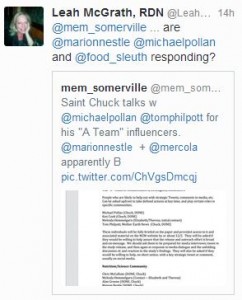Five more industry-funded studies with expected results. The score: 55:3
Here’s the latest collection of 5 studies funded by food companies or trade associations, all with results that favor the sponsor’s interests. I’ve just reviewed them and found a couple of duplicates, so this is a corrected score. The correct score is 55 industry-funded studies with positive results vs. 3 with results unfavorable to industry—since mid-March.
I’m particularly interested in the unfavorable category. If you run across any, please send.
Jejunal Casein Feeding Is Followed by More Rapid Protein Digestion and Amino Acid Absorption When Compared with Gastric Feeding in Healthy Young Men. Joanna Luttikhold, Klaske van Norren, Nikki Buijs, Marjolein Ankersmit, Annemieke C Heijboer, Jeannette Gootjes, Herman Rijna, Paul AM van Leeuwen, and Luc JC van Loon. J. Nutr. 2015; 145:2033-2038 doi:10.3945/jn.115.211615.
- Conclusions: Jejunal feeding of intact casein is followed by more rapid protein digestion and AA absorption when compared with gastric feeding in healthy young men. The greater postprandial increase in circulating EAA concentrations may allow a more robust increase in muscle protein synthesis rate after jejunal vs. gastric casein feeding.
- Funding: Supported by Nutricia Research, Utrecht, Netherlands. J Luttikhold was employed by Nutricia Research; K van Norren is a guest employee of Nutricia Research; and LJC van Loon has served as a consultant for Nutricia Research. [Note: Nutricia Research is a subsidiary of Danone].
Higher Total Protein Intake and Change in Total Protein Intake Affect Body Composition but Not Metabolic Syndrome Indexes in Middle-Aged Overweight and Obese Adults Who Perform Resistance and Aerobic Exercise for 36 Weeks. Wayne W Campbell, Jung Eun Kim, Akua F Amankwaah, Susannah L Gordon, and Eileen M Weinheimer-Haus. J. Nutr. 2015; 145:2076-2083 doi:10.3945/jn.115.213595.
- Conclusions: In conjunction with exercise training, higher TPro [total protein] promoted positive changes in BC [body composition] but not in MetS [metabolic syndrome] indexes in overweight and obese middle-aged adults. Changes in TPro from before to during the intervention also influenced BC responses and should be considered in future research when different TPro is achieved via diet or supplements.
- Funding: Supported by the US Whey Protein Research Consortium (to WWC) among others. WW Campbell was a member of the National Dairy Council Whey Protein Advisory Panel while the research was being conducted.
Intense Sweeteners, Appetite for the Sweet Taste, and Relationship to Weight Management. France Bellisle. Current Obesity Reports March 2015, Volume 4, Issue 1, pp 106-110 10.1007/s13679-014-0133-8
- Conclusion: While many of the existing studies cannot identify any causal links between use of LES [artificial, low-energy sweeteners] and appetite for sweetness, randomized trials in children and adults suggest that use of LES tends to reduce rather than increase the intake of sugar-containing foods and to facilitate, rather than impair, weight loss.
- Conflict: Parts of [this study] are extracted from a non-published document for which the author received an honorarium from the International Sweeteners Association (ISA). France Bellisle is a member of the Scientific Advisory Board for General Mills and has received travel reimbursement and honoraria for contributions in scientific congresses from Mondelez, ISA, and General Mills.
Impact of cocoa flavanol intake on age-dependent vascular stiffness in healthy men: a randomized, controlled, double-masked trial. Christian Heiss & Roberto Sansone & Hakima Karimi & Moritz Krabbe & Dominik Schuler & Ana Rodriguez-Mateos & Thomas Kraemer & Miriam Margherita Cortese-Krott & Gunter G. C. Kuhnle & Jeremy P. E. Spencer & Hagen Schroeter & Marc W. Merx & Malte Kelm & for the FLAVIOLA Consortium, European Union 7th Framework Program. AGE (2015) 37: 56 DOI 10.1007/s11357-015-9794-9
- Conclusion: CF [cocoa flavanol] intake reverses age-related burden of cardiovascular risk in healthy elderly, highlighting the potential of dietary flavanols to maintain cardiovascular health.
- Funding: …Additional funding was provided by an unrestricted grant by MARS, Inc…MARS, Inc. provided the standardized test drinks used in this investigation. HS is employed by MARS, Inc., a member of the FLAVIOLA research consortium and a company engaged in flavanol research and flavanol-related commercial activities.
Cocoa flavanol intake improves endothelial function and Framingham Risk Score in healthy men and women: a randomised, controlled, double-masked trial: the Flaviola Health Study. Roberto Sansone, Ana Rodriguez-Mateos , Jan Heuel, David Falk, Dominik Schuler, Rabea Wagstaff, Gunter G. C. Kuhnle, Jeremy P. E. Spencer, Hagen Schroeter, Marc W. Merx, Malte Kelm and Christian Heiss for the Flaviola Consortium, European Union 7th Framework Program. British Journal of Nutrition, September 9, 2015. doi:10.1017/S0007114515002822.
- Conclusion: In healthy individuals, regular CF [cocoa flavanol] intake improved accredited cardiovascular surrogates of cardiovascular risk, demonstrating that dietary flavanols have the potential to maintain cardiovascular health even in low-risk subjects.
- Funding: Additional funding was provided…through an unrestricted grant by MARS Inc. MARS Inc. also provided the standardised test drinks used in this investigation… H. S. provided test drinks on behalf of Mars Inc… H. S. is employed by MARS Inc., a member of the Flaviola research consortium and a company engaged in flavanol research and flavanol-related commercial activities. [The conflict statement also discloses that MARS employee H.S. shared responsibility for designing the study, writing the paper, and approving the final content].
- Comment: Lest the implicit (but never stated directly) “eat more chocolate” message of these studies be missed, Mars sent out a press release: “Cocoa flavanols lower blood pressure and increase blood vessel function in healthy people.”




